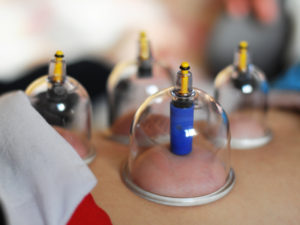

Cupping: A New Twist on an Ancient Tradition
The ancient Chinese tradition of dry cupping is a therapy in which heated glass cups are applied to the skin creating suction to meridians to help encourage the flow of energy (chi) inside the body.
I first experienced cupping in the early 90’s as an adjunct to acupuncture and massage for pain relief after a car accident. What I personally liked about the treatment was that, while many therapies push into the muscle and fascia, cupping seemed to pull tissue away from the skeletal structure producingwhat I can best describe as a ‘vacuum of relief’ swirling and creating space where there was compression. If there was really good suction, you could glide the cup over the skin, drawing up muscle and fascia, increasing blood flow and dispelling lymph and metabolic waste.
I was trained and began to use cupping in my massage practice in early 2003, but only in a very general sense, as I was not competently proficient in the meridians that traditional Chinese medicine recognizes. I loved using it in the beginning, but after a few years it became a bit of a novelty.
 Cut to the 2016 Olympics, where physical therapist and University of California, San Francisco Assistant Clinical Professor Chris DaPrato has repurposed (we love that buzz word, yeah?) this old favorite, creating an entirely new modality called Myofascial Decompression or MFD for short. The purpose of MFD is not to unblock Qi or to improve blood flow for healing diseases, but is designed to increase connective tissue mobility via movement pattern reeducation and breaking down scar tissue that can inhibit motion; the visible evidence of both treatments are circular hickeys of varying tones.
Cut to the 2016 Olympics, where physical therapist and University of California, San Francisco Assistant Clinical Professor Chris DaPrato has repurposed (we love that buzz word, yeah?) this old favorite, creating an entirely new modality called Myofascial Decompression or MFD for short. The purpose of MFD is not to unblock Qi or to improve blood flow for healing diseases, but is designed to increase connective tissue mobility via movement pattern reeducation and breaking down scar tissue that can inhibit motion; the visible evidence of both treatments are circular hickeys of varying tones.
Olympians are sporting their pain map tattoos in approval of this new approach, most notably Michael Phelps; as we could have guessed; his powerful shoulders require treatment, in both girdle and joint, especially around the rotator cuff and deltoids. I am sure he enlists other treatments in combination with cupping and that other sport participant’s use cupping but we can’t tell because they are clothed. I am excited to try this new technique for myself and if I see benefit, possibly implement it into my practice.
Stay tuned.
Thank you for reading!





